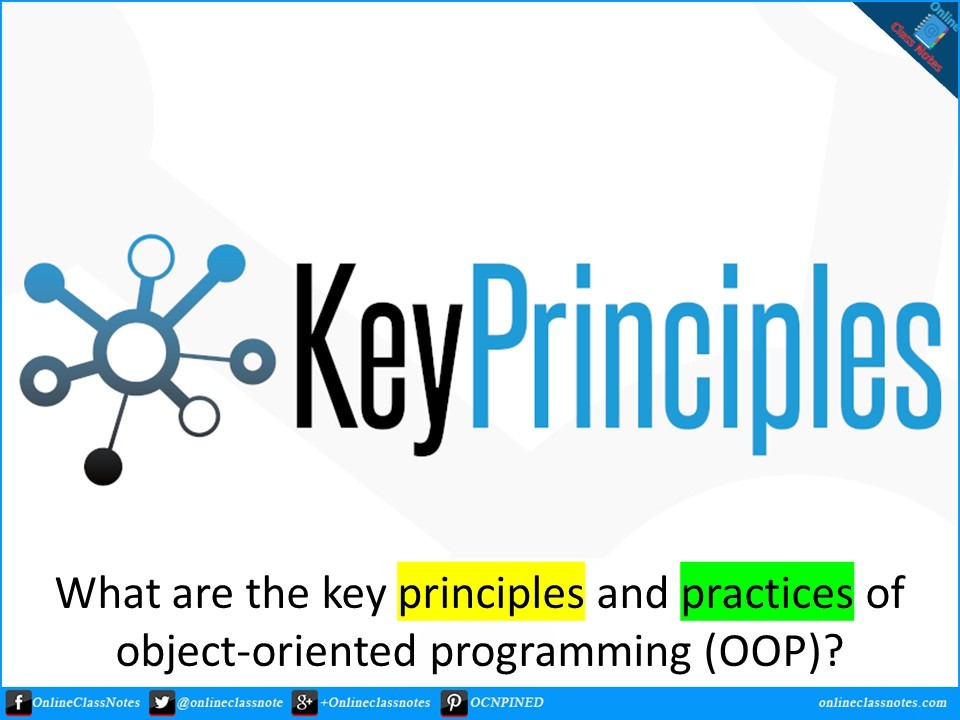Mastering Object-Oriented Programming (OOP): Key Principles and Practices
Introduction:
Object-Oriented Programming (OOP) is a widely used paradigm in software development that allows for modular, flexible, and maintainable code. It revolves around the concept of objects, which encapsulate data and behavior.
Key Principles of Object-Oriented Programming:
Encapsulation:
Encapsulation is the principle of bundling data and the methods that operate on that data within a single entity, called an object. It allows for data hiding, as the internal state of an object is only accessible through well-defined interfaces. Encapsulation promotes information hiding, abstraction, and modularity, making code more maintainable and robust.
Inheritance:
Inheritance is a mechanism that enables the creation of new classes based on existing classes, inheriting their attributes and behaviors. It promotes code reuse and the creation of hierarchical relationships among classes. Inheritance allows for the extension and specialization of existing classes, facilitating efficient and structured code organization.
Polymorphism:
Polymorphism refers to the ability of objects to take on different forms or behaviors based on the context in which they are used. It allows for the implementation of methods with the same name but different functionality in different classes. Polymorphism promotes code flexibility, modularity, and extensibility, as it enables the interchangeability of objects within a common interface.
Abstraction:
Abstraction is the process of simplifying complex systems by representing only essential characteristics while hiding implementation details. It allows developers to focus on the high-level structure and functionality of objects rather than their internal complexities. Abstraction enhances code readability, maintainability, and scalability, as it provides a clear and concise view of the system’s essential aspects.
Key Practices of Object-Oriented Programming:
Modularity:
Modularity involves breaking down a complex system into smaller, self-contained modules or classes. Each module encapsulates specific functionality and data, promoting code reusability, maintainability, and ease of understanding. Modular code enhances collaboration among developers and enables independent development and testing of components.
Encapsulation:
Encapsulation is a practice closely related to the principle of the same name. It involves hiding the internal details and state of an object, exposing only the necessary interfaces or methods to interact with the object. Encapsulation ensures data integrity, prevents direct access to internal state, and allows for controlled manipulation of object behavior.
Abstraction:
Abstraction is both a principle and a practice. It involves creating abstract classes or interfaces that define common behavior and characteristics shared by a group of objects. Abstract classes provide a blueprint for derived classes, while interfaces define a contract for classes to implement. By leveraging abstraction, developers can write code that is decoupled from specific implementations, promoting flexibility, maintainability, and code extensibility.
Polymorphism:
Polymorphism is a practice that allows objects of different types to be treated interchangeably through a common interface. It enables code flexibility and extensibility, as objects can be used in various contexts without requiring explicit knowledge of their specific types. Polymorphism simplifies code maintenance and promotes the use of generic algorithms and interfaces.
Object-Oriented Programming (OOP) is based on key principles and practices that enable developers to create modular, reusable, and maintainable code. By embracing principles such as encapsulation, inheritance, polymorphism, and abstraction, and following practices like modularity, encapsulation, abstraction, and polymorphism, developers can design and implement software systems that are flexible, scalable, and easy to understand. OOP fosters code reusability, promotes efficient collaboration among developers, and provides a structured approach to software development. Understanding the principles and practices of OOP empowers developers to write robust and efficient code that meets the demands of modern software development.
